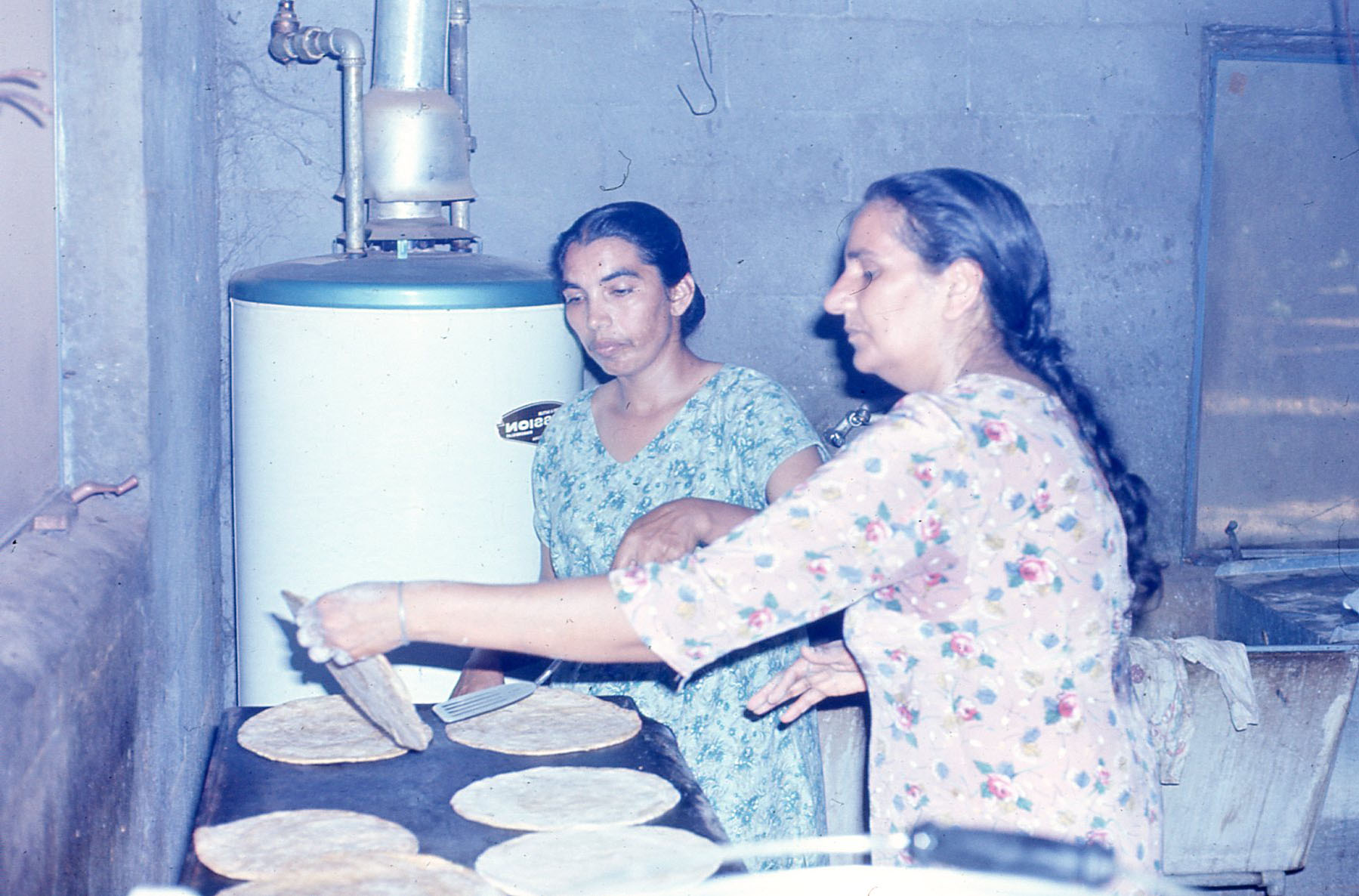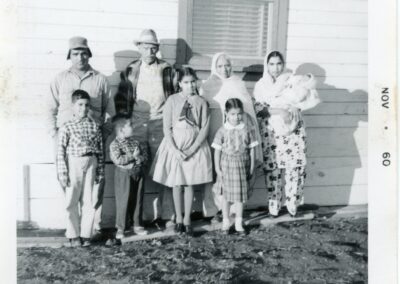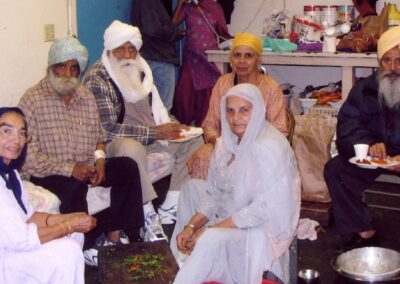Swarn Kaur Johl
Swarn Kaur Johl (May 31, 1931 – June 14, 2015) was likely the first Amritdhari woman to settle in the Yuba City area.* Unusually intelligent and dedicated to Sikhi, she played an instrumental role in the revival of the Sikh faith in the local community between the 1950s and 1970s. She possessed a gift for teaching Sikhi concepts in simple language that were easy for her female family members and friends to grasp. She also led a prayer group in Yuba City’s Tierra Buena Gurdwara after it opened in 1970.
Born in the village of Dhandra in the Ludhiana district of Punjab, she moved with her family to Tatanagar, a steeltown in Bihar as a young girl. During bombing raids during the Second World War, she and her family members returned to Punjab for safely (except for her father who remained in Bihar for work). She completed eight years of education up through Burma Mines Middle School (the khalsa school at the local Gurdwara) in Jamshedpur.
Swarn Kaur was unusually dedicated to Sikhi, devoting hours each day to reciting prayers and the scripture. At the age of 13, she started reciting a great deal of Gurbani that she learned at the Burma Mines Gurdwara in Tatanagar. Each day she recited the five prayers that every Amritdhari Sikh is supposed to perform each day. In addition, she recited other lengthy prayers, including the Bai Varan (22 ballads) and Das Granthi (select prayers from Guru Gobind Singh). She also regularly recited the Guru Granth Sahib (the 1,430 page Sikh scripture). Having taken Amrit at birth, she took Amrit again before marriage to fulfill her grandfather’s wishes. She was also well-versed in the Sikh code of conduct.

Swarn Kaur Johl Passport Photo, India, 1950.

Karm Singh and Swarn Kaur Johl family, Yuba City, 1954.
At age 16 in 1947, she married Karm Singh Johl in her natal village of Dhandra in the Ludhiana district of Punjab. Four years later, Swarn Kaur relocated to the US via plane together with her husband and baby girl on September 15, 1951. Karm Singh Johl had applied for immigration in the lottery system in which 100 people per country were permitted to enter the US annually. He was also helped a great deal by Tuly Singh Johl, who treated him like a son. Later she would sponsor her father in 1962, as well as her mother and three brothers in 1963. Since she was more educated than her husband, she managed the family farm business and household finances. In the mid-1970s, Swarn Kaur completed the Amrit ceremony for a third time together with her husband and many other local Sikhs. She appears to have taken Amrit in solidarity with her husband who re-dedicated himself to Sikhi after cutting his hair in his early years in the US.
Of all of the Punjabi women who arrived in Yuba City in the decade after the Second World War, Swarn Kaur was among the most educated and independent. She enrolled in English classes at Yuba College, and was one of only a few Punjabi women in the area who could speak, read and write in English. A beautiful letter writer, she wrote vivid, detailed accounts of her life in America to her sister, Joginder, in Punjabi. Her explanations were so thorough that Joginder felt prepared for her new life in America when she arrived. Swarn Kaur also became a US citizen. Quickly learning to drive, she was one of only a few Punjabi women who could transport her family and women friends by car.
Due to her influence, Swarn Kaur’s home became a hub for devotional gatherings for the local Sikh community. Fulfilling his daughter’s request, Ranjit Singh Grewal brought one of the first Sikh Holy Books to Yuba City in March 1962. Shortly after her father’s arrival, the first Guru Granth Sahib prayer meeting occurred in her home. Even though she lived in a small three-bedroom house with a husband and five children, she created a darbar sahib (prayer room housing the Guru Granth Sahib) that everyone called the Baba Ji room. She frequently hosted monthly Sangrand prayer meetings for the local community. Her younger sister, Joginder, frequently called her to explain Sikh concepts to her.
Swarn Kaur offered countless hours of seva for the local Gurdwara. She sewed the first nishan sahib (flag) for the Gurdwara. In the years after Yuba City’s Gurdwara was opened on December 18, 1970, she started a weekly Sukhmani Sahib (a Sikh prayer for peace and contentment) prayer group that was mainly attended by women. She also frequently served as an Akhand Pathi, a woman who joins a group of five Amritdhari Sikhs in reciting the entire Guru Granth Sahib continuously over a 48-hour period. Together with other women, she would prepare langar (food for the Gurdwara’s kitchen) regularly for the sangat (congregation). She also made sweets at a time when no local stores sold them. Finally, she would sew kacchera (one of the five articles of faith worn by Amritdhari Sikhs) at a time when they could not be obtained locally.
Swarn Kaur and her husband, Karm Singh Johl, raised five children: Joginder Kaur Sidhu (1950), Jugraj Singh Johl (1952), Indarjit Kaur Sidhu (1953), Balraj Singh Johl (1957), and Manraj Singh Johl (1960).
Photos courtesy of the Grewal family.
Sources: Interviews by Nicole Ranganath with Manohar Singh Grewal, Phone, October 13, 2020 and August 15, 2022, Joginder Kaur Dhaliwal and Dal Dhaliwal, ZOOM, July 27, 2022, Kuldip Singh Grewal, ZOOM, July 28 and July 29, 2022, and Harjit Singh Grewal, Rocklin, CA, August 9, 2022.
*Vital statistics confirmed by death certificate on Ancestry.com.

Swarn Kaur with friend, Swaran Kaur, making rotis, Yuba City, 1963.

Swarn Kaur Johl Children, Yuba City, 1960.


